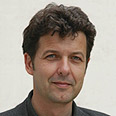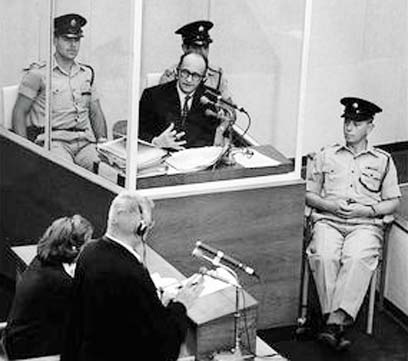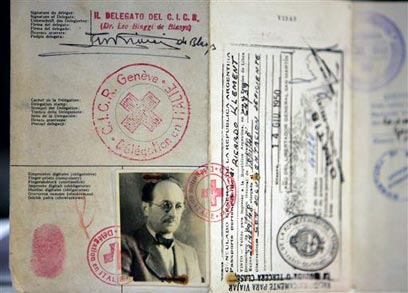
Coffee with Eichmann
Ynet reporter meets with infamous Nazi's son, who tries to stay away from curse of his father
At his home in Berlin, Eichmann prefers to keep his private life private, and shies away from any connection to or public mention of the SS obersturmfuhrer that was his father. He lives a routine life. Every morning he goes to the German Archaeological Institute, where he serves as head of the Orient department. As part of his work, he has visited the far ends of the earth over the years, in search of new findings. There is just one country, which may be one of the most fascinating in his field, that he has yet to visit.
"Ricardo Eichmann does not owe me, or anyone else, a single thing. Not an email, not a meeting, not an insight on being the 'son of'," I repeatedly reminded myself from the moment Stephan, an archaeologist friend, told me, in a side note at the end of a tedious conversation about politics and the flotilla, about his affable partner in Yemen excavations. The youngest son of the man who was, among other things, directly responsible for the 1944 mass expulsion of Hungary's Jews - including my grandmother and her family – is, according to Stephan, an amicable man. He had no objection to me phoning him and giving his name. On the contrary, Stephan said we may have an interest in meeting.
Glass of water, deep breath, and phone call
Ricardo's only vague memories of his father can be found in an article in German weekly Die Zeit. The five-year-old boy, who was born in Argentina, remembers a bus ride in Buenos Aires and the chocolate given to him by Adolf, the Third Reich's "expert" on Jewish affairs, who he knew only as "father" for a very short time. But one day, his father had disappeared. Not just physically, but also the term itself. Over the years, even after immigrating back to Germany, the Eichmann family did not speak of "mother's man" or "Adolf Eichmann," as Ricardo would later refer to him.
It's noon Wednesday. I try again to make contact. A glass of water by the telephone, two deep breaths, and I dialed. "Archaeological Institute, hello," says a male voice on the other end of the line. "Hello, may I please speak with Professor Eichmann?" I ask in formal German. "One moment please," the voice says, and makes way for a familiar waiting tone, the same tone I had heard on my three previous attempts. The next stop should be a polite woman telling me that the director is not in, and that I could try to reach him via email.

Man in glass box - Adolph Eichmann's trial (Photo: GPO)
I am comforted by the assumption that there will be another transition point before reaching Eichmann, since, even if I was a graduate of an intensive course on telephone conversations between the third generation and the offspring of Nazi officials, there is nothing that can really prepare you for such an encounter. But my assumption was shattered at once, without any buffer point. "Eichmann," a voice said on the other end. I was glad and terrified all at once.
Eichmann is not interested in an interview, and after this matter was straightened out, he agreed to my request for a meeting. He invited me to his office to "discuss our shared history, which presents many different aspects and still influences interpersonal relations in the modern world", as he put it. We agreed to meet on Monday at noon, a date which left me a long weekend to prepare for my blind date with Eichmann junior. Optimal guidelines for the meeting: It should be open, relaxed, and not just about the Holocaust.
On Jewish paranoia
Monday arrives. And as the clock's hands approach the designated time, I am less and less certain as to why I am showing up in the life of a man who is 30 years my senior. A man who was doing everything possible to live a normal life, to focus on his field of interest, in peace. The only thing I am taking with me, in case of awkward silences or if he shows interested in personal tales – are documents of my family that were found in the archives of Nazi war criminals in Bad Arolsen.
The S42 train races in the direction of Heidelberger Platz. This is the perfect time to ask myself: Why am I the only one in the coach traveling to the Archaeological Institute to discuss gas and not fossils? Why will Berlin never just be a city of marvelous culture, splendid lakes, and beautiful people? Why do I come from a paranoid people whose most popular field of interest at the moment is the question of the likelihood of a second Holocaust? Why, as poet Meir Ariel best put it, "We were already in the oven and now we are on the grill?" And most importantly: Is there even any justification for this meeting?
The answer that I got on the quiet, green Podbielski Boulevard in western Berlin was decisive. The Archaeological Institute is neighbor to an impressive transparent, minimalist building, typical of the style of new office buildings in the German capital. The guard took me through an indoor garden on the second floor, where Ricardo Eichmann sat. A handsome, amicable and cordial black-haired man rose up to greet me.
For an hour-and-a-half Professor Eichmann and I talked about almost everything. In his quiet, spacious office, full of books on archaeological findings and ancient civilizations, I encountered a man who does not run from horror stories about his father or his people, but at the same time is careful not to let his handling of the past turn into another obsession. A man who, years ago in London, shook the hand of Mossad official Zvi Aharoni, one of the agents who tracked down and captured his father in Argentina, and moved on.
'Just like anybody else'
The last thing that Ricardo Eichmann wants is to become a symbol or messenger of any sort. He believes his words and experiences are no different than that of any other person from his generation educated in Germany in the first decades after the Holocaust. However, after hearing his significant, moving words, I asked his permission to write about the conversation from my own perspective, while keeping certain parts off the record. He was not thrilled with the idea, but this time he did not refuse.
Ricardo spoke of how it would have been much easier on his family if Adolf Eichmann had expressed remorse over his actions before his death. He spoke of the difficult emotions his family had to live with, in the absence of any remorse. I told him how his father's trial in Jerusalem is etched in the consciousness of an entire generation, my father's generation, who witnessed for the first time their parents listening to the radio and weeping.

Memories from Argentina – Eichmann's passport
He spoke of his inability to grasp the "following orders" argument that his father used to excuse his actions. I explained to him how the trial reopened the wounds between the Israeli elite and the Holocaust survivors – those whom the "new Jews" did not like to see. I told him about how the Holocaust caused different groups in the Israeli society to feel like they don't belong.
Eichmann junior said the way of thinking in the regime his father played a central role in was a "sick" one. We spoke of the madness that led the Nazis to invest so many resources into the extermination even at the very end. If these resources were directed at the war effort, they may have altered the battle's outcome. He said extremist regimes' irrational behavior hurting their own interests is not a thing of the past, adding examples are abundant.
I recounted to Eichmann my December visit to Lodz, Poland, where I went to see my grandfather's family's home. I described to him what I found there, a city with a 30% Jewish population before his father began sending them off the death camps. I told him how much their presence, and absence, could still be felt in the city. Eichmann said he admires the Jewish method of education, which he says teaches students to question and criticize. He said this is contrary to the teaching methods he was familiar with, which focus mainly on accumulating knowledge and memorizing it. I told him that he was being too kind, at least with regards to the Israeli education system.
Dealing with mpossible situation
I also told him the fear of Germany and aversion to buying German-made products has never gone away in Israel, and perhaps never would, but that there was a growing interest in German culture and language in the Jewish State and that quite a few Germans live in Tel Aviv – so if he ever gets tired of Berlin, there is a good chance he would like the first Hebrew city.
Those who reside for long periods of time in Germany often find that the average Joe's opinion on the Holocaust is far removed from that of the government. Just a day before my meeting with Ricardo, a good friend of mine returned upset from a meeting with a German friend who told her that more than six million soviets had died in World War II, so though it was clear that what had happened was horrible, it was not clear why exactly such a big deal was being made of the Jewish Holocaust.
Others claim the Germans themselves were victims of the Nazis. On the other side, however, are many Germans, mostly youths, who associate obsessive feelings of guilt with Judaism, Israel, and Hebrew.
Ricardo Eichmann, I was immediately aware, belonged to neither of these groups. He is probably dealing with his past in the healthiest manner possible, considering the impossible situation he is forced to deal with in life. He is just one generation and light years apart from the man who sat in the glass booth in Jerusalem, a man probably most associated with the phrase: The banality of evil.
If Eichmann ever visits Israel it will be a quiet visit, devoid of announcements or symbolic tours. He will come mainly to visit Israeli colleagues from his field and historic sites, such as Yavneh-Yam, one of the most important port cities in Israel during a period that lasted from the Bronze Age to the Middle Ages.
I said that if he comes on one of his vacations, I would be glad to show him Tel Aviv and Jerusalem. We shook hands and went our separate ways – maybe until next time, but probably forever.










